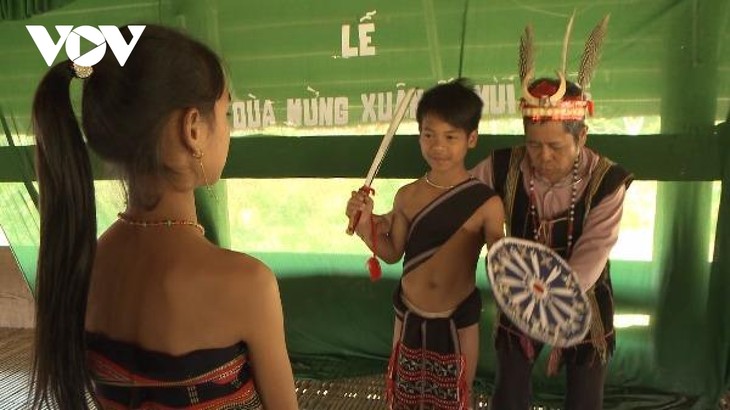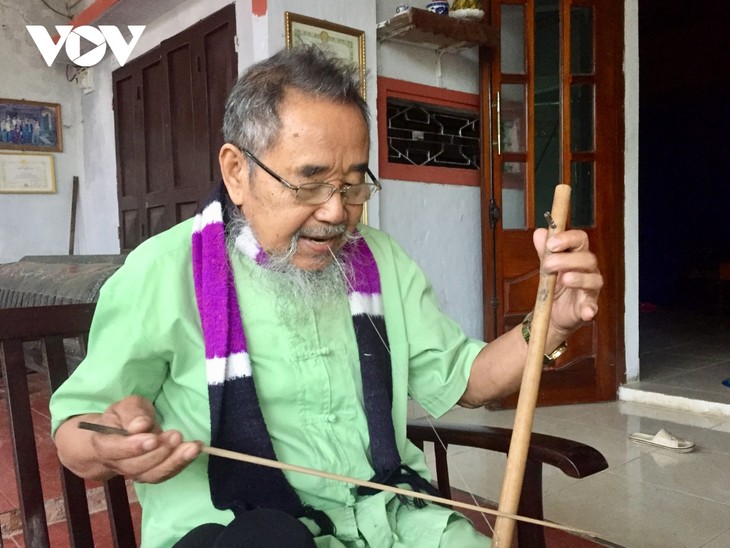(VOVWORLD) - Mainly residing in the central region of Vietnam, the Co Tu ethnic people have many unique cultural practices such as Ly singing, Tung Tung Da Da or Co Tu’s dance of offering to the heaven, as well as drum and gong playing, which have been closely associated with their daily lives for many generations. Acknowledging the importance of preserving these valuable cultural traditions, Co Tu elders have been working hard to collect and restore them.
 Elder Bhling Hanh teaches Co Tu children of Cong Don commune a traditional dance. Elder Bhling Hanh teaches Co Tu children of Cong Don commune a traditional dance. |
Bhling Hanh, who is now over 70 years old, still plays the panpipe. The villagers so enjoy hearing his panpipe playing echo from the forests and mountains that they call him fondly “the soul of the forests and mountains”.
A former official of the local medicine and judicial sectors, Bhling Hanh was elected Chairman of the Zuoih communal Fatherland Front Committee.
He went to each household in his commune to encourage them to preserve their traditional musical instruments, including gongs, drums, and the Abel, an instrument consisting of a flute attached to a string which is bowed with a stick.
He founded a team of gong and drum players, called Cong Don team, and rehearsed traditional drum and gong dance music for performances in Hanoi, Can Tho, and Tay Ninh.
"Since my family was very poor, we could not afford our own gongs and drums. I could play these instruments only at village festivals. I could never let a day pass without the sound of drums, gongs, and panpipes," Bhling Hanh told VOV.
"Music is the soul of the Co Tu people. It embodies the love of life that has been passed down to us by our predecessors. We have an obligation to pass it to future generations."
Thanks to Bhling Hanh, many young Co Tu people are able to play the group’s gong music.
"I feel happy and honored to promote Co Tu culture throughout Vietnam. Thanks to Bhling Hanh’s tutelage, I have discovered my unique ethnic culture," said Bhling Thai, a member of the Cong Don gong team in Zuoih commune.
100-year-old Y Kong, a village elder of Dong Giang district, Quang Nam province, built a Guol house, a Co Tu communal house, with his own money, hoping to get younger villagers to come there to practice their own ethnic cultural traditions.
In the Guol house, Y Kong displays stone instruments, flutes, and dozens of gong sets. He travels to nearby schools to teach the children Ly singing, gong playing, and stories about their ethnic origins.
 Elder Y Kong plays the Abel, an instrument consisting of a flute attached to a string which is bowed with a stick. Elder Y Kong plays the Abel, an instrument consisting of a flute attached to a string which is bowed with a stick. |
"I bought new jars, gongs, and brocade blankets to decorate the Guol house. I also made a drum to play at engagement and wedding ceremonies. My wish is to preserve the unique culture of the Co Tu people," said Y Kong.
There are few village elders like Y Kong who can make and play all the musical instruments of the Co Tu people, and are willing to educate the younger generations about their culture.
"Village elder Y Kong has taught young Co Tu people about our culture, including gong playing, Tung Tung Da Da dancing, and brocade weaving. Over the years, he has also worked to preserve our ancient craft of wood carving, which has been on the verge of disappearing," said Do Huu Tung, Deputy Chairman of Dong Giang district.
The Co Tu people have been encouraged by their elders to preserve their ancient crafts like brocade weaving, rattan weaving, traditional cooking, and wine making.